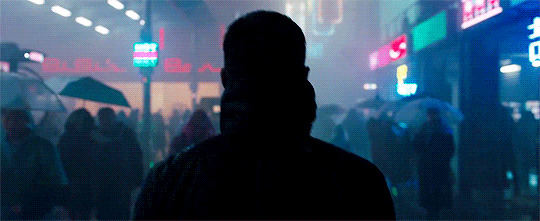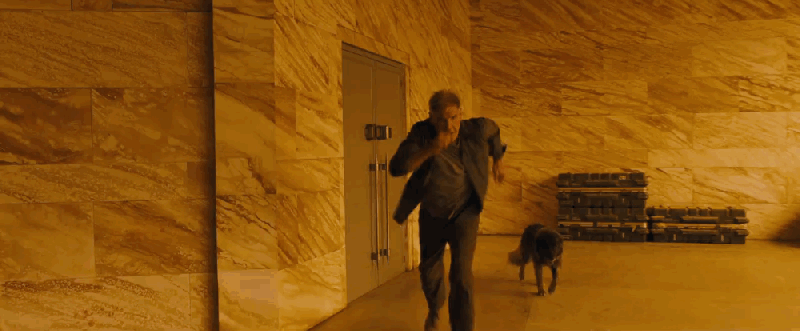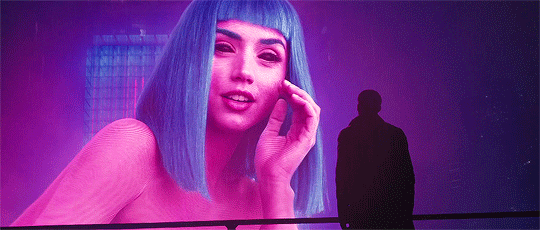Ridley Scott's Blade Runner is, justifiably, considered one of the best sci-fi movies ever made. It does everything the genre is supposed to do and does them well. It asks big questions, explores humanity and its strengths and imperfections, ponders the future, and even has some great action to go along with it. In the last 34 years the film has grown in our estimation, primarily because we've seen what can happen when Scott attempts to play around with his genre classics. His fumbling attempts to expand on Alien have diminished that once-great franchise and rightfully left fans concerned the same would happen with Blade Runner 2049.
They needn't have worried.
Under the guidance of brilliant director Denis Villeneuve, whose sci-fi bonafides are unquestioned after Best Picture-nominee Arrival, the long-awaited Blade Runner 2049 is bold, mesmerizing, and grandiose. It doesn't just explore many of the same themes of evolution and mortality set forth in the original, it digs deeper into them without fully answering the questions that have been lingering for three decades. Even if it did I couldn't tell you. When the publicists practically beg you not to spoil anything, then they read a letter from the director further pleading for you not to, well, it's a good idea not to spoil anything.
No offense to Scott, but he may want to consider handing both of his franchises over to Villeneuve, or at least to someone who has enough distance from the original to give visual birth to new concepts. The sci-fi noir aesthetic is still there but bigger, more haunting, a desolate steampunk world full of existential angst that instantly feels familiar. And yet there's still so much new to discover; I can't stress enough how important it is to not only revisit The Final Cut version of Scott's classic, but to watch the three prequel short films that set up Blade Runner 2049. The information provided within them is invaluable to fleshing out the events leading up to this, but also the many new and interesting characters that play integral roles.
The biggest addition is, of course, Ryan Gosling as Officer K, a character not unlike Harrison Ford's Rick Deckard. He too has taken on the mantle of a blade runner, and his hunt for runaway replicants also threatens a delicate balance. But the stakes are even greater this time, and when a dangerous secret is uncovered it could mean the end of everything. In the previous years there was a massive blackout (again, be sure to watch those prequels) that threw the world into chaos. Emerging from this was a new paradigm for human/replicant relations, and the birth of the powerful Wallace Corporation, run by the mysterious Niander Wallace (Jared Leto) who has big plans for the replicant program.
K's search does eventually lead him to Deckard, with Harrison Ford reprising the role that launched a thousand questions which have dogged this franchise. Once again Ford is suiting up as a character he'd long since put away, but will forever be identified with, and it's like he never left. Arguably he's better here than he was in the original, and attacks the role with the same vigor he did as Han Solo in The Force Awakens. To be honest, his return was the one I was most concerned about. Deckard comes with a lot of baggage with potential to keep the film mired in the past. And yet Villeneuve, along with writers Hampton Fancher (who penned the first movie) and Michael Green, have unlatched the moorings and improved upon Blade Runner with a story that has multiple characters trying to find some empirical truth.
I know the Academy Awards will come around in a few months and there will be a Best Cinematography category, but really the contest is already over. Roger Deakins has accomplished the best work of his storied career with sleek, complex visuals that add to its philosophical heft. He doesn't merely mimic the look of its predecessor, but reimagines it after 30 years of gloom and desperation. The giant, neon holographic images aren't as awe-inspiring this time; there's a sadness behind them.
While Gosling strikes a commanding image as Officer K, and Ford ups the ante when Deckard enters the picture, the entire supporting cast is terrific. Dave Bautista, Robin Wright, and Sylvia Hoeks add depth and detail to this universe, even with their limited screen time. But there needs to be special mention for Ana de Armas as Joi, a character whose relationship with K underscores so much about what Blade Runner is all about. She could have been rendered annoyingly on-the-nose as a result, but her performance is so rich that makes the movie better every second she's on screen. If there's a complaint about the performances it would be with Leto, whose Niander Wallace doesn't quite feel right. He's inauthentic in a movie full of synthetic characters.
Villeneuve has recaptured the cold and distant aura, but I would argue too much of the movie keeps audiences at arm's length. It makes sense as nothing in Blade Runner 2049 is as it seems, but the toll is taken when certain scenes fail to pack the dramatic punch they could have.
When all is said and done, Blade Runner 2049 enhances Ridley Scott's Blade Runner, but also improves upon it. He has taken the seed planted by Scott, nurtured it, and now it has blossomed into one of the finest works of science-fiction ever. Does it answer every question we've been pondering all of these years? Of course not, but in all of its ruminations about the future, Blade Runner 2049 has opened up a future in which this franchise will continue to grow and evolve.
Rating: 4 out of 5
Trav's Tip: No, really, you'll want to watch those prequels. You can find links to all three of them here.


















